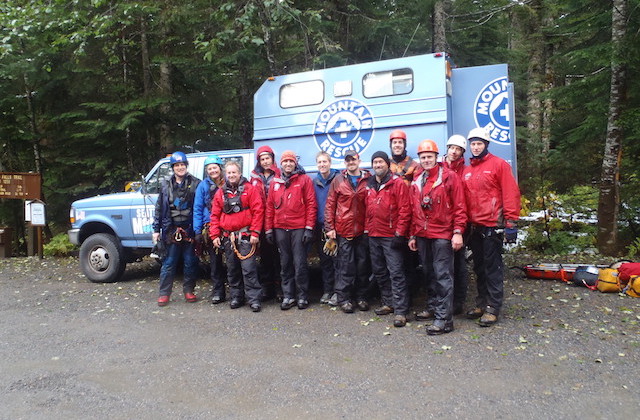Meet the Heroes of Search and Rescue
When it comes to getting outdoor enthusiasts out of sticky situations, search and rescue is the one to call for help. But what exactly is search and rescue? It’s an elite group of volunteers that’s attached to the sheriff’s office in each county and goes where regular EMS can’t. Its members find lost people, treat injured parties and assist them in getting back to civilization safely. Because they are volunteers, no one gets paid and the group doesn’t charge for its services*. (Yes, you read that right. It’s free.) Instead, search and rescue is funded by grants, generous companies, grateful individuals and a limited amount of taxpayer money.

Based on the very technical rescues they mastermind, you’d never know that most search and rescue personnel are, by day, software engineers, teachers, writers and stay-at-home moms. But don’t let their day jobs fool you. When it comes to being professional rescuers, there’s no one better for the job.
That’s because these volunteers go through a minimum of 164 hours of rigorous training in map and compass navigation, outdoor survival and first aid, often during the harshest weather conditions to simulate actual rescues. And that’s just to become state certified as a “ground pounder.” Many individuals join specialty units once their state certification is complete. King County alone has eight such units, including horseback, K-9, 4x4 and ski patrol teams, each with their own additional training requirements and practice hours. Snohomish County even has a helicopter team.
Volunteers are drawn to search and rescue for many reasons. For some, it’s the opportunity to learn advanced outdoors skills. For others, it’s a physical escape from a sedentary day job. A surprising number of volunteers get involved in the organization as a way to give back after being rescued themselves.
Regardless of the many reasons they’re initially drawn to the organization, search and rescue volunteers have one big thing in common: they love helping people. It’s their passion, their reason for being. It’s why they buy their own gear for missions, drive their own personal vehicles to rescues and spend their own money on the gas necessary to do so. For them, going where EMS can’t—and finding lost people, treating injured parties and assisting them in getting back to civilization safely—isn’t an inconvenience. It’s a privilege.
Yana Radenska, who volunteers with both WTA and search and rescue, says it best: “There’s nothing we’d rather be doing.”
Essential Information
Q: Who can call for search and rescue’s help?
A: Anyone!
Q: How do I call them?
A: Activate your SPOT or personal locator beacon in an emergency, or call 911.
Q: How much does it cost?
A: It’s free!
Q: What if I have an animal with me?
A: Search and rescue can sometimes help an animal that’s with an injured human. But they don’t assist injured animals. For that, try WASART at (425) 681-5498.
Q: How can I help out?
A: You can donate money or volunteer.
* This article focuses on volunteer search and rescue, which is the vast majority of the group's personnel. A limited number of search and rescue positions are taxpayer funded; in many counties, there is one paid staff member to dozens (or even hundreds) of volunteers. Larger counties may have more.
________________________________________________________________
In Their Voices
 Steve Allen, Seattle Mountain Rescue
Steve Allen, Seattle Mountain Rescue
"The most addictive thing is when you’ve been personally involved in saving someone’s life. That’s an incredible rush."
 Yana Radenska, Snohomish County Helicopter Rescue Team
Yana Radenska, Snohomish County Helicopter Rescue Team
"With mountain rescue you touch more lives than you could ever possibly imagine. I’ve found that to be true over and over again."
 Drew Fletcher, Seattle Mountain Rescue
Drew Fletcher, Seattle Mountain Rescue
"I got attracted to search and rescue when I got injured very badly. I told myself, ‘as soon as I recover from this, I think I’m going to join these guys.’"
 Eric Rosenberg, King County Explorer Search and Rescue
Eric Rosenberg, King County Explorer Search and Rescue
"I like that people can rely on me to provide training, be a leader, raise funds, carry someone out of the woods. Whatever needs to be done."
 Dalton Shellenberger, Cowlitz County Explorer Search and Rescue (trainee)
Dalton Shellenberger, Cowlitz County Explorer Search and Rescue (trainee)
"I'm excited about working with good people and the possibility of saving someone's life or changing it dramatically in a good way."
 Heather Reed, King County Explorer Search and Rescue
Heather Reed, King County Explorer Search and Rescue
"You learn to love adverse conditions in our training. You learn to love the wet and love the mud."
 Terry Lamp, Skagit County Search and Rescue (retired)
Terry Lamp, Skagit County Search and Rescue (retired)
"My son and I did the training together and had a lot of fun. We even got to be on the same team a lot of the time. It was a great experience for him and for me too. "

